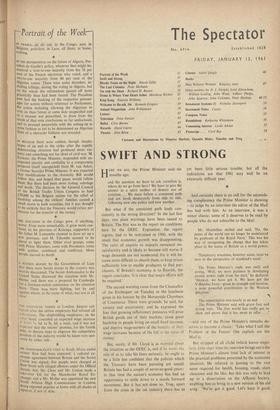-- Portrait of the Week IN FRANCE, on di: old; in
the Congo, non; in Belgium, peut4tre; in Laos, all three; at "home, nothing.
IN THE REFERENDUM 011 the future of Algeria, Pre- sident de Gaulle's policy, whatever that might be, received a four-to-one majority from the 76 per cent of the French electorate who voted, and a two-to-one majority from 60 per cent of the Algerian voters. There were some disorders, in- cluding killings, during the voting in Algeria, but on the whole the referendum passed off more Peacefully than had been feared. The President now had the backing of the respective percent- ages for action without reference to Parliament; the action including allowing the Algerians to vote on their future at some date unspecified and iu a manner not prescribed, to draw from the result of that vote conclusions so far undisclosed, and to proceed meanwhile with the setting-up in some fashion as yet to be determined an Algerian State of a character hitherto not revealed.
IN BELGIUM there were sudden, though slender, hopes of an end to the strike after the rapidly deteriorating situation had produced more vio- lence and something not far short of civil war. M. Eyskens, the Prime Minister, responded with un- expected alacrity and cordiality to a compromise Proposal (itself unexpected) from M. van Acker, a former Socialist Prime Minister. It was expected that modifications to the Austerity Bill would follow this, and hoped that peace would follow them. But there had been more rioting, sabotage and death. The decision by the General Council of the British Trades Union Congress to lend £50,000 to the Belgian unions for the relief of hardship among the strikers' families caused a small storm in both countries, but it was thought to be unlikely that the Treasury would refuse per- mission for the transfer of the money.
The SITUATION in the Congo grew, if anything, worse. Even more remarkably, it grew more con- fused. In the province of Katanga, supporters of the fallen M. Lumumba claimed to have set up a new province, and M. Tshombe seemed to be about to fight them. Other rival groups, some With Prime Ministers, some with Presidents, some With neither, combined and conflicted. More People starved to death.
A SUDDEN REPORT by the Government of Laos that there were Soviet troops in the country was heavily discounted. The Soviet Ambassador to the United States discussed the situation with Mr. Herter, and there was a proposal by Cambodia for a fourteen-nation conference on the situation there. There was. more fighting, but by and against whom, in the name of what, was not at all Clear.
1IIL UNOFFICIAL 'STRIKE at London Airport col- laP.ed after the airline employers had refused all euncessions. The shipbuilding employers, on the °Bier hand, conceded an expected wage increase Of troll 7s. 6d. to 8s. 6d. a week, and it was not expected that the unions' promise, for the fourth time, to discuss steps to improve the competitive Position of the industry would be taken very seri- ously by either side.
"R. FIAMMARSKJOLD'S VISIT to South Africa ended sooner than had been expected; a cultural ex- change agreement between Britain and the Soviet Union was signed; five people were charged at Bow Street with alleged offences under the Official Secrets Act; Mr. Clore and Mr. Cotton made a take-over bid for the Manchester Royal Ex- change; and a Mr. Muller was appointed the new South African High Commissioner in London, being reported popular at home with all shades of °Pinion if not of skin.


































 Previous page
Previous page